高中英语必修3-Unit 1 Festivals around the world Section B Learning about Language教学课件(30张ppt)
文档属性
| 名称 | 高中英语必修3-Unit 1 Festivals around the world Section B Learning about Language教学课件(30张ppt) | 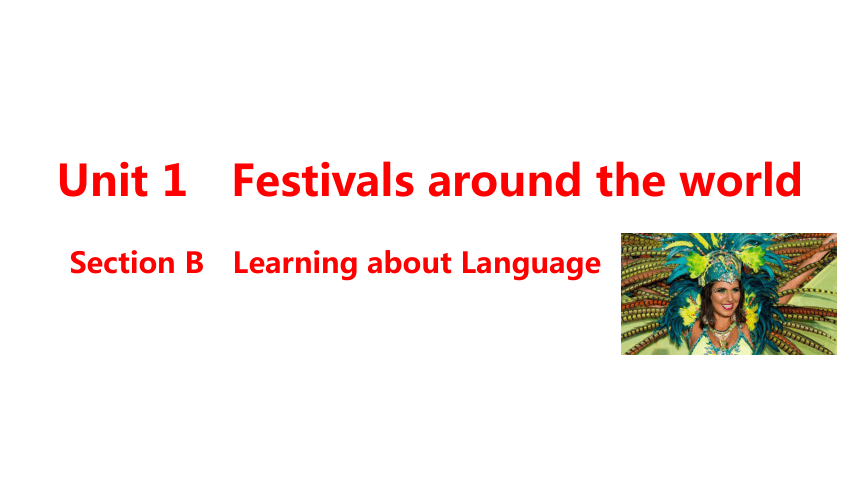 | |
| 格式 | zip | ||
| 文件大小 | 1.3MB | ||
| 资源类型 | 教案 | ||
| 版本资源 | 人教版(新课程标准) | ||
| 科目 | 英语 | ||
| 更新时间 | 2020-03-03 20:48:08 | ||
图片预览

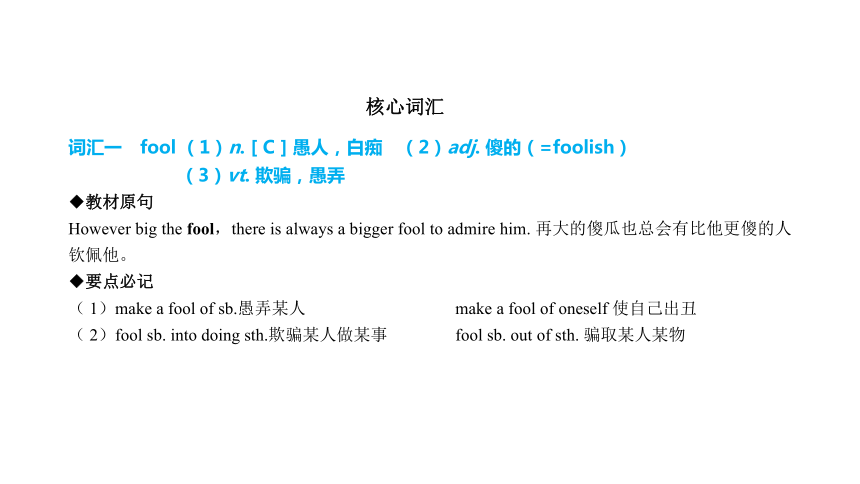
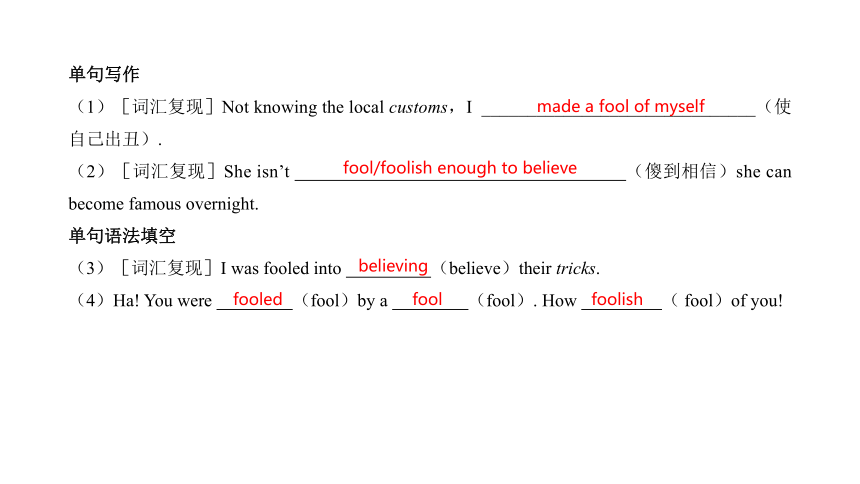
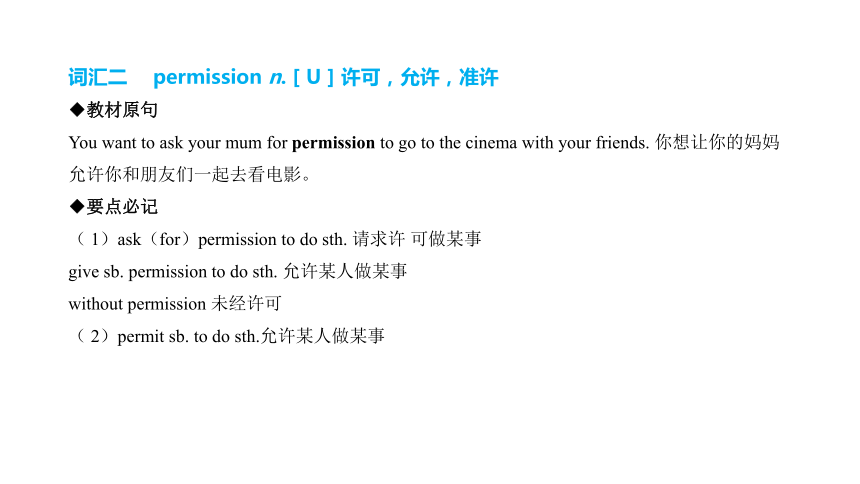
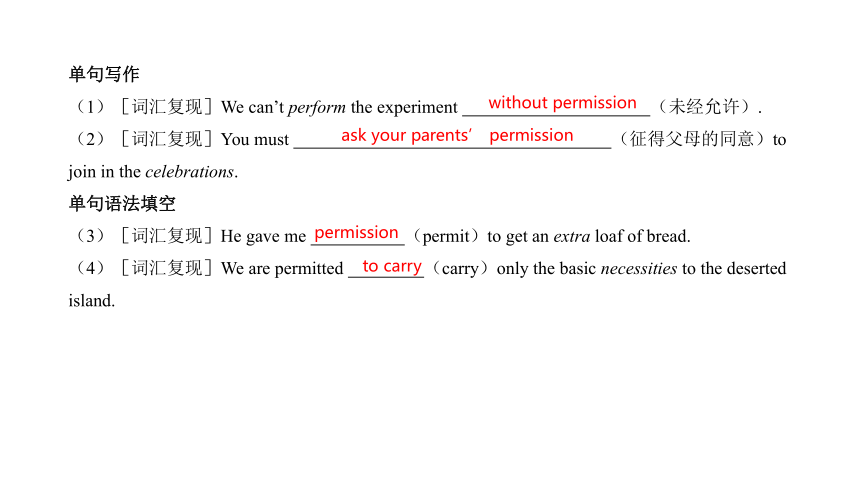
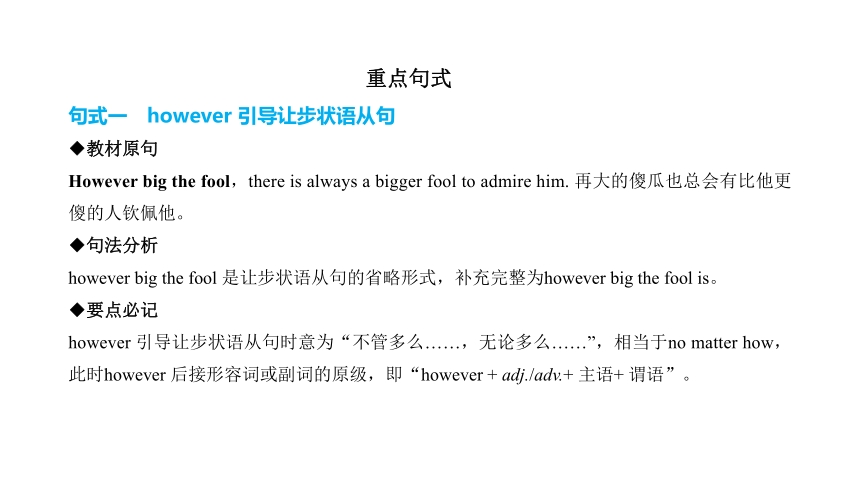
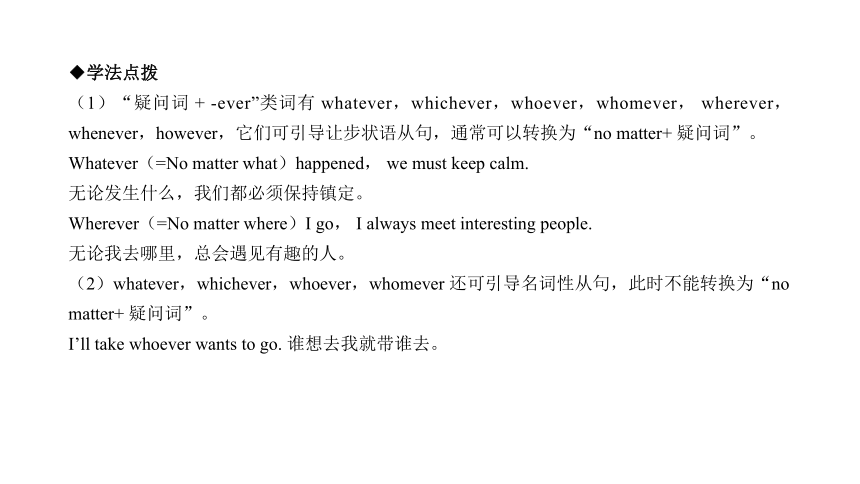
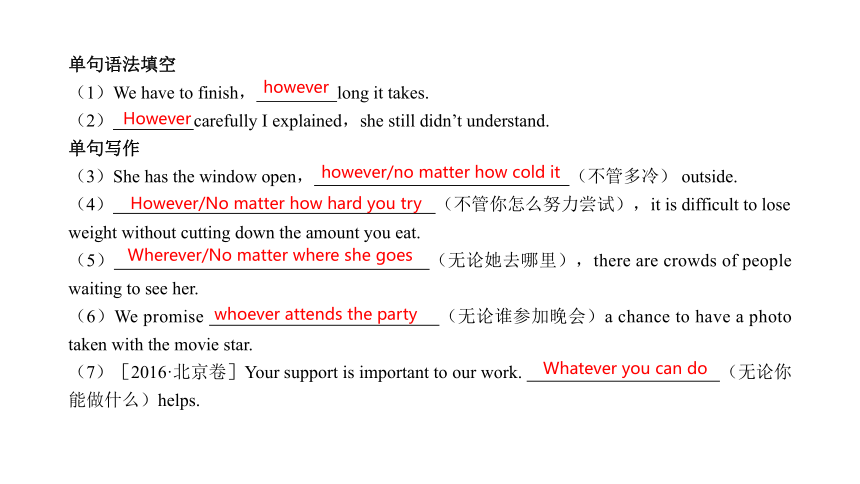
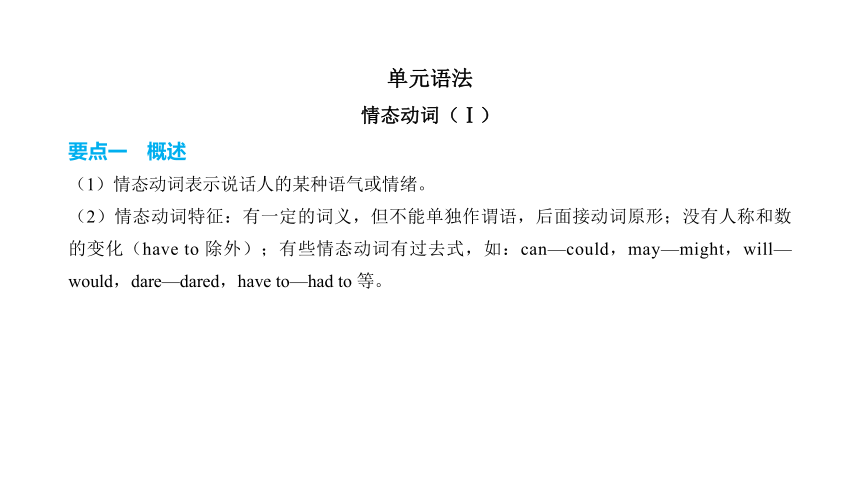
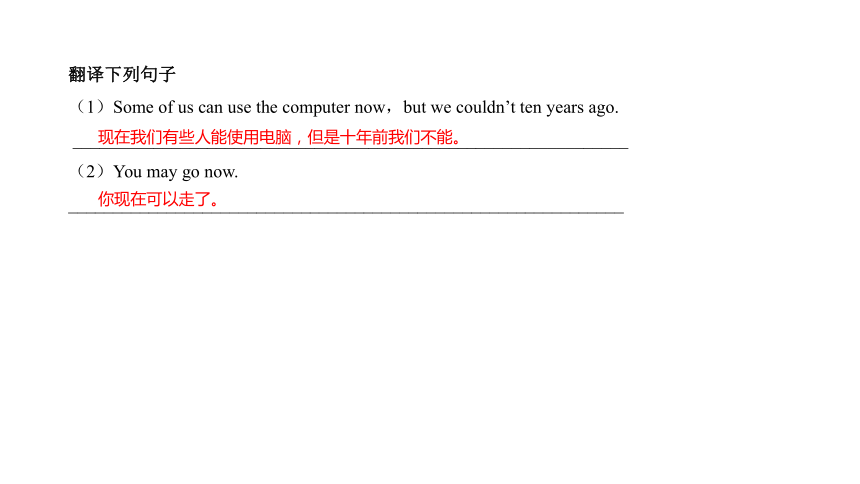
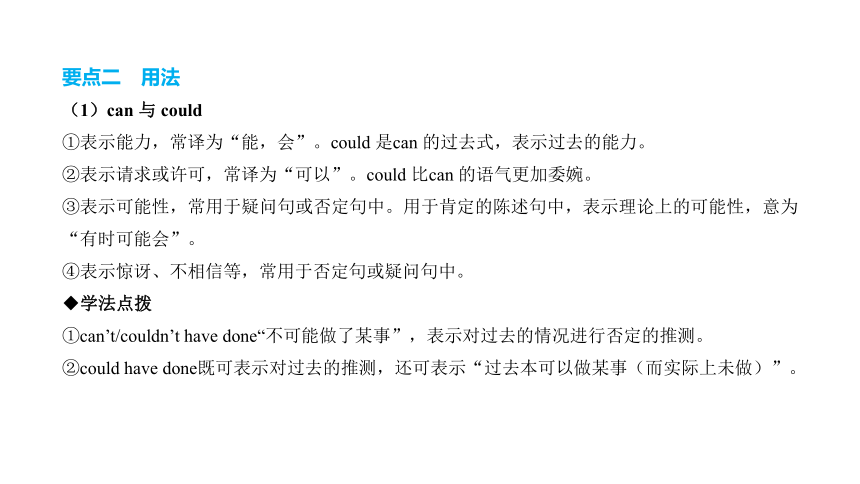
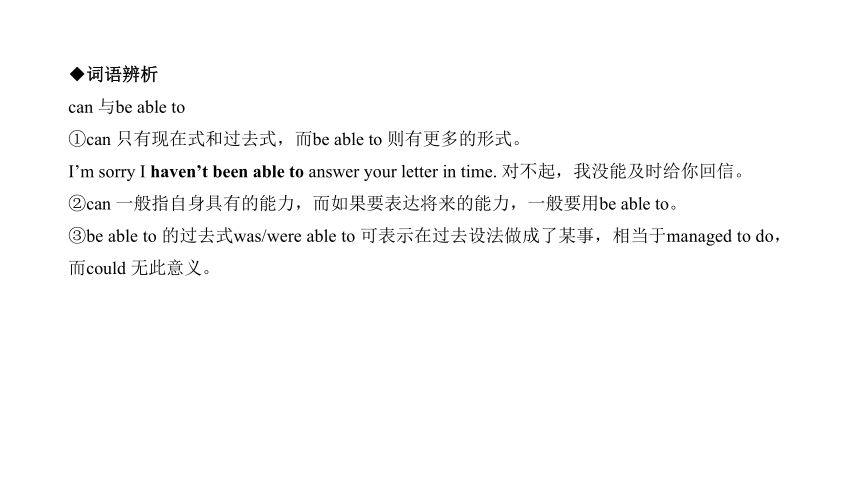
文档简介
(共30张PPT)
Unit 1 Festivals around the world
Section B Learning about Language
核心词汇
词汇一 fool (1)n.[C]愚人,白痴 (2)adj. 傻的(=foolish)
(3)vt. 欺骗,愚弄
◆教材原句
However big the fool,there is always a bigger fool to admire him. 再大的傻瓜也总会有比他更傻的人钦佩他。
◆要点必记
( 1)make a fool of sb.愚弄某人 make a fool of oneself 使自己出丑
( 2)fool sb. into doing sth.欺骗某人做某事 fool sb. out of sth. 骗取某人某物
单句写作
(1)[词汇复现]Not knowing the local customs,I ______________________________(使自己出丑).
(2)[词汇复现]She isn’t (傻到相信)she can become famous overnight.
单句语法填空
(3)[词汇复现]I was fooled into (believe)their tricks.
(4)Ha! You were (fool)by a (fool). How ( fool)of you!
made a fool of myself
fool/foolish enough to believe
believing
fooled fool foolish
词汇二 permission n.[U]许可,允许,准许
◆教材原句
You want to ask your mum for permission to go to the cinema with your friends. 你想让你的妈妈允许你和朋友们一起去看电影。
◆要点必记
( 1)ask(for)permission to do sth. 请求许 可做某事
give sb. permission to do sth. 允许某人做某事
without permission 未经许可
( 2)permit sb. to do sth.允许某人做某事
单句写作
(1)[词汇复现]We can’t perform the experiment (未经允许).
(2)[词汇复现]You must (征得父母的同意)to join in the celebrations.
单句语法填空
(3)[词汇复现]He gave me (permit)to get an extra loaf of bread.
(4)[词汇复现]We are permitted (carry)only the basic necessities to the deserted island.
without permission
ask your parents’ permission
permission
to carry
重点句式
句式一 however 引导让步状语从句
◆教材原句
However big the fool,there is always a bigger fool to admire him. 再大的傻瓜也总会有比他更傻的人钦佩他。
◆句法分析
however big the fool 是让步状语从句的省略形式,补充完整为however big the fool is。
◆要点必记
however 引导让步状语从句时意为“不管多么……,无论多么……”,相当于no matter how,此时however 后接形容词或副词的原级,即“however + adj./adv.+ 主语+ 谓语”。
◆学法点拨
(1)“疑问词 + -ever”类词有 whatever,whichever,whoever,whomever, wherever,whenever,however,它们可引导让步状语从句,通常可以转换为“no matter+ 疑问词”。
Whatever(=No matter what)happened, we must keep calm.
无论发生什么,我们都必须保持镇定。
Wherever(=No matter where)I go, I always meet interesting people.
无论我去哪里,总会遇见有趣的人。
(2)whatever,whichever,whoever,whomever 还可引导名词性从句,此时不能转换为“no matter+ 疑问词”。
I’ll take whoever wants to go. 谁想去我就带谁去。
单句语法填空
(1)We have to finish, long it takes.
(2) carefully I explained,she still didn’t understand.
单句写作
(3)She has the window open, (不管多冷) outside.
(4) (不管你怎么努力尝试),it is difficult to lose weight without cutting down the amount you eat.
(5) (无论她去哪里),there are crowds of people waiting to see her.
(6)We promise (无论谁参加晚会)a chance to have a photo taken with the movie star.
(7)[2016·北京卷]Your support is important to our work. (无论你能做什么)helps.
however
However
however/no matter how cold it
However/No matter how hard you try
Wherever/No matter where she goes
whoever attends the party
Whatever you can do
单元语法
情态动词(Ⅰ)
要点一 概述
(1)情态动词表示说话人的某种语气或情绪。
(2)情态动词特征:有一定的词义,但不能单独作谓语,后面接动词原形;没有人称和数的变化(have to 除外);有些情态动词有过去式,如:can—could,may—might,will—would,dare—dared,have to—had to 等。
翻译下列句子
(1)Some of us can use the computer now,but we couldn’t ten years ago.
______________________________________________________________
(2)You may go now.
______________________________________________________________
现在我们有些人能使用电脑,但是十年前我们不能。
你现在可以走了。
要点二 用法
(1)can 与 could
①表示能力,常译为“能,会”。could 是can 的过去式,表示过去的能力。
②表示请求或许可,常译为“可以”。could 比can 的语气更加委婉。
③表示可能性,常用于疑问句或否定句中。用于肯定的陈述句中,表示理论上的可能性,意为“有时可能会”。
④表示惊讶、不相信等,常用于否定句或疑问句中。
◆学法点拨
①can’t/couldn’t have done“不可能做了某事”,表示对过去的情况进行否定的推测。
②could have done既可表示对过去的推测,还可表示“过去本可以做某事(而实际上未做)”。
◆词语辨析
can 与be able to
①can 只有现在式和过去式,而be able to 则有更多的形式。
I’m sorry I haven’t been able to answer your letter in time. 对不起,我没能及时给你回信。
②can 一般指自身具有的能力,而如果要表达将来的能力,一般要用be able to。
③be able to 的过去式was/were able to 可表示在过去设法做成了某事,相当于managed to do,而could 无此意义。
第一组
选词填空(can/could)
(1)I can speak English,but I speak Japanese.
(2)[词汇复现]She play several instruments at the age of eight.
(3)—Can/Could I use your studio?
—Of course you .
(4)You park over there.
(5)—Could she be in the classroom?
—No,she .
(6)It be quite cold at night here.
(7)What he be doing at this time of night?
(8)I saw her just now. She have gone to Beijing.
(9)He have passed the exam,but he was too careless.
can’t
could
can
can
can’t
can
can
can’t / couldn’t
could
选词填空(can/be able to)
(10)Will you come?
(11)The young man (not)carry the big box.
(12)This time I failed the exam,but I’ll pass the exam next time.
(13)The fire was very big,but most people escape from it.
be able to
can’t
be able to
were able to
(2)may与 might
①表示请求或许可,常译成“可以”。might 表示请求时语气更加委婉。
用于
②表示可能性,意为“也许,可能,大概”, might 比may 的可能性要小。may/might not 表示“可能不”。
③may 可用于祈使句中,表示祝愿。
第二组
选词填空(may/might)
(1)You keep the book for two weeks.
(2)I wonder if I speak to your son.
(3)—May I come in?
—Yes,you /can./No,you can’t/mustn’t.
(4)He be very busy now.
(5)Let’s speed up,or we be late.
(6)He have missed his train.
(7) you succeed!
may
might
may
may
may/might
may
May
(3)must
①表示“必须”,否定形式mustn’t 表示 “ 不准,禁止”。
用于
◆词语辨析 must 与have to
She must do it herself. I won’t help her.她必须自己做,我不会帮她。(说话人的意志)
She has to do it herself. She has got no one to help her. 她不得不自己做,没有人帮她。(客观情况使得)
must have to
强调主观看法 强调客观需要
只有一种形式 有多种时态形式
否定形式表示 “ 禁止” 否定形式表示“不必”
②表示肯定推测,意为“一定,肯定”,只能用于肯定句中。表推测时must 的否定形式是can’t/couldn’t。
③表示“偏要,偏偏”,常指不愉快的事。
第三组
英译汉
(1)You must be home by 11 o’clock. ____________________________________
(2)You mustn’t smoke here. ____________________________________
(3)—Must we finish the work today? ____________________________________
—Yes,you must. /No,you needn’t/don’t have to. ____________________________________
(4)You mustn’t tell others. ____________________________________
(5)You don’t have to tell others. ____________________________________
(6)[词汇复现]They must be anxious to learn about local customs.
(7)[词汇复现]He is in high spirits. He must have received an award.
_______________________________________________________
(8)Why must you always interrupt me? ____________________________________
你必须在 11 点之前回家。
你不准在这里吸烟。
我们今天必须完成这项工作吗?
是的,必须完成。/ 不,你们不必。
你不准告诉别人。
你不必告诉别人。
他们一定急于了解当地的风俗。
他神采飞扬,一定是获奖了。
你为什么总是非要打断我呢?
(4)shall与 should
①shall 的用法
a. 用于第一、三人称的疑问句中,表示征求意见或请求指示。
b. 用于第二、三人称的陈述句中,表示命令、警告、允诺或威胁等。
c. 用于第三人称的陈述句,在条约、规定、法令等文件中表示义务或规定,意为“应该,必须”。
②should 的用法
a. 表示义务、劝告、建议、命令等,意为 “ 应该”。
b. 表示有一定根据的推测,意为“可能, 应该会”。
c. 表示说话人的惊讶、愤怒、失望等特殊情感,意为“竟然”。
◆学法点拨
should have done 表示“本该做某事 (而实际上未做)”
shouldn’t have done 表示“本不该做某 事(而实际上做了)”
You should have asked for help. 你本应该请求帮助的。
You shouldn’t have told her the news. 你本不该把这个消息告诉她。
第四组
英译汉
(1)Shall we meet at 6 o’clock tonight? ____________________________________
(2)Shall she go now? ____________________________________
(3)He shall do it by himself. ____________________________________
(4)You shall have the book when I finish reading it. ____________________________________
(5)You shall fail if you don’t work harder. ____________________________________
(6)He shall be punished sooner or later. ____________________________________
(7)[词汇复现]No reader shall remove a book from the library without permission.
_________________________________________________
今晚我们六点见面好吗?
她现在可以走了吗?
他得自己做。
这本书我看完就给你。
你如果不更加努力工作就会失败。
他迟早要受到惩罚。
未经许可,读者不准把书带出图书馆。
(8)We should respect our teachers and parents.
________________________________________________
(9)You should read his new book.
________________________________________________
(10)It should be a nice day tomorrow.
________________________________________________
(11)I should have finished the book by Friday.
________________________________________________
(12)It’s strange that he should believe the prediction.
________________________________________________
我们应该尊重我们的老师和父母。
你应该读一读他的新书。
明天应该是个好天气。
到星期五我应该能读完这本书。
真奇怪,他竟会相信这则预言。
(5)will与 would
①表示请求、建议,用于第二人称的疑问句中,would 比will 的语气更加委婉。
②表示意志、愿望或决心,有“愿,要”之意。will 指现在,would 指过去。
③表示一种习惯、倾向或固有性质等,意为“惯于,总是”。will 指现在,would 指过去。
◆词语辨析 would 与used to
·would 强调过去某种特定情况下的活动,与现在没有联系;而used to 强调过去的习惯性动作或状态如今已不存在,与现在形成对比。
·would 只表示重复的活动,不表示状态;而used to 既可表示过去重复的动作,也可表示过去持续的状态。
He would get up at eight when he was on the farm. 他过去在农场的时候总是8 点起床。(现在可能还这样)
He used to get up at eight. 他过去常常8 点起床。(现在不这样了)
People used to think that the earth is flat. 人们过去以为地球是平的。(过去人们的看法,表示一种状态)
第五组
英译汉
(1)Will you hand me that book? ________________________________
(2)[词汇复现]Would you please tell me something about local customs?
________________________________________
(3)I will never do that again. ________________________________
(4)[词汇复现]She said she would keep her word.
________________________________________
(5)Oil will float on water. ________________________________
(6)[词汇复现]She would spend one hour dressing up before going out.
_______________________________________________________________
请你把那本书递给我好吗?
请你告诉我一些当地的 风俗好吗?
我再也不会做那种事了。
她说她愿意履行她的诺言。
油总是浮在水上。
她总是打扮一个小时才出门。
选词填空(will/would)
(7)People die without air or water.
(8)When we were children,we gather around Grandpa after supper,listening to his stories.
(9) you mind my smoking here?
will
would
Would
基础知识自测
Ⅰ 用适当的情态动词填空
1.[2018·北京卷]In today’s information age,the loss of data cause serious problems for a company.
2.[2017·天津卷]My room is a mess,but you (not)clean it before I go out tonight. I can do it in the morning.
3.[2017·北京卷]Samuel,the tallest boy in our class, easily reach the books on the top shelf.
4.[2016·北京卷]I love the weekend,because I get up early on Saturdays and Sundays.
5.[2016·浙江卷]George have gone too far. His coffee is still warm.
can
needn’t
can
needn’t
can’t
6.[2016·天津卷]It was really annoying;I get access to the data bank you had recommended.
7.[2015·北京卷]It’s getting late. I really go now. My daughter is home alone.
8.[2015·福建卷]It’s too bad that you failed in the job interview. You have made full preparations.
9.[2015·浙江卷]It was so noisy that we hear ourselves speak.
10.[2015·陕西卷]You feel all the training a waste of time,but I’m a hundred percent sure later you’ll be grateful you did it.
11.[2015·四川卷]You be careful with the camera. It costs!
12.[2015·重庆卷]You be Carol. You haven’t changed a bit after all these years.
13. Robert is good at sports and finish the 100-meter race a little more than ten seconds. 14. No one stop us from carrying out the plan.
15. Rose be in the classroom now,for I saw her leave school several minutes ago.
couldn’t
must
should
couldn’t
may/might
must
must
can
shall
can’t
学科素养提升
Ⅱ 语法填空
A
主题:人与社会(社会) 体裁:记叙文 话题:舞狮和舞龙
[2019·湖北宜昌高一联考]Lion dance is a form of 1 (tradition)dance in China,which 2 be often seen in important festivals and great events. China is home 3 the Dragon Dance and Lion Dance. The two performances 4 (welcome) by people from various ethnic groups for generations. It is said 5 the lion dance in China originated in the Southern and Northern Dynasties with a history of more than one thousand years. The lions stand for joy and 6 (happy). As a result,during festivals and grand ceremonies,people would perform lion dance to create a happy and
7 (excite)atmosphere. Many young people know that the dragon dance and the lion dance are performed in Spring Festival fairs and 8 (celebrate). But they don’t know that the two activities have accumulated thick historical cultures and are 9 (extreme)valuable cultural heritages
10 (hand)down from Chinese people’s ancestors.
traditional
can
to
have been welcomed
that
happiness
celebrations
extremely
exciting
handed
B
主题:人与社会(社会) 体裁:记叙文 话题:春节
Every year there is a Spring Festival in China. Usually it 1 (fall)in January or February. It is 2 (important)festival among all the festivals in China. So before it comes,everyone 3 (have)to prepare things. They buy pork,beef,chicken,fruits and many other things. And they often make a special kind of food—“dumplings”,
4 means “coming together”. During the days 5 the festival,parents buy new clothes for their children. Children also buy 6 (present)for their parents. On the Spring Festival Eve,all the family members come back to their hometown. This is 7 happy moment. Some sing and dance,some play cards and others get the dinner ready. When they enjoy the meal 8 (happy), they give each other the best wishes for the 9 (come)year. They all have a 10 (wonder)time.
falls
the most important
has
which
before
presents
a
happily
coming
wonderful
The end!
Unit 1 Festivals around the world
Section B Learning about Language
核心词汇
词汇一 fool (1)n.[C]愚人,白痴 (2)adj. 傻的(=foolish)
(3)vt. 欺骗,愚弄
◆教材原句
However big the fool,there is always a bigger fool to admire him. 再大的傻瓜也总会有比他更傻的人钦佩他。
◆要点必记
( 1)make a fool of sb.愚弄某人 make a fool of oneself 使自己出丑
( 2)fool sb. into doing sth.欺骗某人做某事 fool sb. out of sth. 骗取某人某物
单句写作
(1)[词汇复现]Not knowing the local customs,I ______________________________(使自己出丑).
(2)[词汇复现]She isn’t (傻到相信)she can become famous overnight.
单句语法填空
(3)[词汇复现]I was fooled into (believe)their tricks.
(4)Ha! You were (fool)by a (fool). How ( fool)of you!
made a fool of myself
fool/foolish enough to believe
believing
fooled fool foolish
词汇二 permission n.[U]许可,允许,准许
◆教材原句
You want to ask your mum for permission to go to the cinema with your friends. 你想让你的妈妈允许你和朋友们一起去看电影。
◆要点必记
( 1)ask(for)permission to do sth. 请求许 可做某事
give sb. permission to do sth. 允许某人做某事
without permission 未经许可
( 2)permit sb. to do sth.允许某人做某事
单句写作
(1)[词汇复现]We can’t perform the experiment (未经允许).
(2)[词汇复现]You must (征得父母的同意)to join in the celebrations.
单句语法填空
(3)[词汇复现]He gave me (permit)to get an extra loaf of bread.
(4)[词汇复现]We are permitted (carry)only the basic necessities to the deserted island.
without permission
ask your parents’ permission
permission
to carry
重点句式
句式一 however 引导让步状语从句
◆教材原句
However big the fool,there is always a bigger fool to admire him. 再大的傻瓜也总会有比他更傻的人钦佩他。
◆句法分析
however big the fool 是让步状语从句的省略形式,补充完整为however big the fool is。
◆要点必记
however 引导让步状语从句时意为“不管多么……,无论多么……”,相当于no matter how,此时however 后接形容词或副词的原级,即“however + adj./adv.+ 主语+ 谓语”。
◆学法点拨
(1)“疑问词 + -ever”类词有 whatever,whichever,whoever,whomever, wherever,whenever,however,它们可引导让步状语从句,通常可以转换为“no matter+ 疑问词”。
Whatever(=No matter what)happened, we must keep calm.
无论发生什么,我们都必须保持镇定。
Wherever(=No matter where)I go, I always meet interesting people.
无论我去哪里,总会遇见有趣的人。
(2)whatever,whichever,whoever,whomever 还可引导名词性从句,此时不能转换为“no matter+ 疑问词”。
I’ll take whoever wants to go. 谁想去我就带谁去。
单句语法填空
(1)We have to finish, long it takes.
(2) carefully I explained,she still didn’t understand.
单句写作
(3)She has the window open, (不管多冷) outside.
(4) (不管你怎么努力尝试),it is difficult to lose weight without cutting down the amount you eat.
(5) (无论她去哪里),there are crowds of people waiting to see her.
(6)We promise (无论谁参加晚会)a chance to have a photo taken with the movie star.
(7)[2016·北京卷]Your support is important to our work. (无论你能做什么)helps.
however
However
however/no matter how cold it
However/No matter how hard you try
Wherever/No matter where she goes
whoever attends the party
Whatever you can do
单元语法
情态动词(Ⅰ)
要点一 概述
(1)情态动词表示说话人的某种语气或情绪。
(2)情态动词特征:有一定的词义,但不能单独作谓语,后面接动词原形;没有人称和数的变化(have to 除外);有些情态动词有过去式,如:can—could,may—might,will—would,dare—dared,have to—had to 等。
翻译下列句子
(1)Some of us can use the computer now,but we couldn’t ten years ago.
______________________________________________________________
(2)You may go now.
______________________________________________________________
现在我们有些人能使用电脑,但是十年前我们不能。
你现在可以走了。
要点二 用法
(1)can 与 could
①表示能力,常译为“能,会”。could 是can 的过去式,表示过去的能力。
②表示请求或许可,常译为“可以”。could 比can 的语气更加委婉。
③表示可能性,常用于疑问句或否定句中。用于肯定的陈述句中,表示理论上的可能性,意为“有时可能会”。
④表示惊讶、不相信等,常用于否定句或疑问句中。
◆学法点拨
①can’t/couldn’t have done“不可能做了某事”,表示对过去的情况进行否定的推测。
②could have done既可表示对过去的推测,还可表示“过去本可以做某事(而实际上未做)”。
◆词语辨析
can 与be able to
①can 只有现在式和过去式,而be able to 则有更多的形式。
I’m sorry I haven’t been able to answer your letter in time. 对不起,我没能及时给你回信。
②can 一般指自身具有的能力,而如果要表达将来的能力,一般要用be able to。
③be able to 的过去式was/were able to 可表示在过去设法做成了某事,相当于managed to do,而could 无此意义。
第一组
选词填空(can/could)
(1)I can speak English,but I speak Japanese.
(2)[词汇复现]She play several instruments at the age of eight.
(3)—Can/Could I use your studio?
—Of course you .
(4)You park over there.
(5)—Could she be in the classroom?
—No,she .
(6)It be quite cold at night here.
(7)What he be doing at this time of night?
(8)I saw her just now. She have gone to Beijing.
(9)He have passed the exam,but he was too careless.
can’t
could
can
can
can’t
can
can
can’t / couldn’t
could
选词填空(can/be able to)
(10)Will you come?
(11)The young man (not)carry the big box.
(12)This time I failed the exam,but I’ll pass the exam next time.
(13)The fire was very big,but most people escape from it.
be able to
can’t
be able to
were able to
(2)may与 might
①表示请求或许可,常译成“可以”。might 表示请求时语气更加委婉。
用于
②表示可能性,意为“也许,可能,大概”, might 比may 的可能性要小。may/might not 表示“可能不”。
③may 可用于祈使句中,表示祝愿。
第二组
选词填空(may/might)
(1)You keep the book for two weeks.
(2)I wonder if I speak to your son.
(3)—May I come in?
—Yes,you /can./No,you can’t/mustn’t.
(4)He be very busy now.
(5)Let’s speed up,or we be late.
(6)He have missed his train.
(7) you succeed!
may
might
may
may
may/might
may
May
(3)must
①表示“必须”,否定形式mustn’t 表示 “ 不准,禁止”。
用于
◆词语辨析 must 与have to
She must do it herself. I won’t help her.她必须自己做,我不会帮她。(说话人的意志)
She has to do it herself. She has got no one to help her. 她不得不自己做,没有人帮她。(客观情况使得)
must have to
强调主观看法 强调客观需要
只有一种形式 有多种时态形式
否定形式表示 “ 禁止” 否定形式表示“不必”
②表示肯定推测,意为“一定,肯定”,只能用于肯定句中。表推测时must 的否定形式是can’t/couldn’t。
③表示“偏要,偏偏”,常指不愉快的事。
第三组
英译汉
(1)You must be home by 11 o’clock. ____________________________________
(2)You mustn’t smoke here. ____________________________________
(3)—Must we finish the work today? ____________________________________
—Yes,you must. /No,you needn’t/don’t have to. ____________________________________
(4)You mustn’t tell others. ____________________________________
(5)You don’t have to tell others. ____________________________________
(6)[词汇复现]They must be anxious to learn about local customs.
(7)[词汇复现]He is in high spirits. He must have received an award.
_______________________________________________________
(8)Why must you always interrupt me? ____________________________________
你必须在 11 点之前回家。
你不准在这里吸烟。
我们今天必须完成这项工作吗?
是的,必须完成。/ 不,你们不必。
你不准告诉别人。
你不必告诉别人。
他们一定急于了解当地的风俗。
他神采飞扬,一定是获奖了。
你为什么总是非要打断我呢?
(4)shall与 should
①shall 的用法
a. 用于第一、三人称的疑问句中,表示征求意见或请求指示。
b. 用于第二、三人称的陈述句中,表示命令、警告、允诺或威胁等。
c. 用于第三人称的陈述句,在条约、规定、法令等文件中表示义务或规定,意为“应该,必须”。
②should 的用法
a. 表示义务、劝告、建议、命令等,意为 “ 应该”。
b. 表示有一定根据的推测,意为“可能, 应该会”。
c. 表示说话人的惊讶、愤怒、失望等特殊情感,意为“竟然”。
◆学法点拨
should have done 表示“本该做某事 (而实际上未做)”
shouldn’t have done 表示“本不该做某 事(而实际上做了)”
You should have asked for help. 你本应该请求帮助的。
You shouldn’t have told her the news. 你本不该把这个消息告诉她。
第四组
英译汉
(1)Shall we meet at 6 o’clock tonight? ____________________________________
(2)Shall she go now? ____________________________________
(3)He shall do it by himself. ____________________________________
(4)You shall have the book when I finish reading it. ____________________________________
(5)You shall fail if you don’t work harder. ____________________________________
(6)He shall be punished sooner or later. ____________________________________
(7)[词汇复现]No reader shall remove a book from the library without permission.
_________________________________________________
今晚我们六点见面好吗?
她现在可以走了吗?
他得自己做。
这本书我看完就给你。
你如果不更加努力工作就会失败。
他迟早要受到惩罚。
未经许可,读者不准把书带出图书馆。
(8)We should respect our teachers and parents.
________________________________________________
(9)You should read his new book.
________________________________________________
(10)It should be a nice day tomorrow.
________________________________________________
(11)I should have finished the book by Friday.
________________________________________________
(12)It’s strange that he should believe the prediction.
________________________________________________
我们应该尊重我们的老师和父母。
你应该读一读他的新书。
明天应该是个好天气。
到星期五我应该能读完这本书。
真奇怪,他竟会相信这则预言。
(5)will与 would
①表示请求、建议,用于第二人称的疑问句中,would 比will 的语气更加委婉。
②表示意志、愿望或决心,有“愿,要”之意。will 指现在,would 指过去。
③表示一种习惯、倾向或固有性质等,意为“惯于,总是”。will 指现在,would 指过去。
◆词语辨析 would 与used to
·would 强调过去某种特定情况下的活动,与现在没有联系;而used to 强调过去的习惯性动作或状态如今已不存在,与现在形成对比。
·would 只表示重复的活动,不表示状态;而used to 既可表示过去重复的动作,也可表示过去持续的状态。
He would get up at eight when he was on the farm. 他过去在农场的时候总是8 点起床。(现在可能还这样)
He used to get up at eight. 他过去常常8 点起床。(现在不这样了)
People used to think that the earth is flat. 人们过去以为地球是平的。(过去人们的看法,表示一种状态)
第五组
英译汉
(1)Will you hand me that book? ________________________________
(2)[词汇复现]Would you please tell me something about local customs?
________________________________________
(3)I will never do that again. ________________________________
(4)[词汇复现]She said she would keep her word.
________________________________________
(5)Oil will float on water. ________________________________
(6)[词汇复现]She would spend one hour dressing up before going out.
_______________________________________________________________
请你把那本书递给我好吗?
请你告诉我一些当地的 风俗好吗?
我再也不会做那种事了。
她说她愿意履行她的诺言。
油总是浮在水上。
她总是打扮一个小时才出门。
选词填空(will/would)
(7)People die without air or water.
(8)When we were children,we gather around Grandpa after supper,listening to his stories.
(9) you mind my smoking here?
will
would
Would
基础知识自测
Ⅰ 用适当的情态动词填空
1.[2018·北京卷]In today’s information age,the loss of data cause serious problems for a company.
2.[2017·天津卷]My room is a mess,but you (not)clean it before I go out tonight. I can do it in the morning.
3.[2017·北京卷]Samuel,the tallest boy in our class, easily reach the books on the top shelf.
4.[2016·北京卷]I love the weekend,because I get up early on Saturdays and Sundays.
5.[2016·浙江卷]George have gone too far. His coffee is still warm.
can
needn’t
can
needn’t
can’t
6.[2016·天津卷]It was really annoying;I get access to the data bank you had recommended.
7.[2015·北京卷]It’s getting late. I really go now. My daughter is home alone.
8.[2015·福建卷]It’s too bad that you failed in the job interview. You have made full preparations.
9.[2015·浙江卷]It was so noisy that we hear ourselves speak.
10.[2015·陕西卷]You feel all the training a waste of time,but I’m a hundred percent sure later you’ll be grateful you did it.
11.[2015·四川卷]You be careful with the camera. It costs!
12.[2015·重庆卷]You be Carol. You haven’t changed a bit after all these years.
13. Robert is good at sports and finish the 100-meter race a little more than ten seconds. 14. No one stop us from carrying out the plan.
15. Rose be in the classroom now,for I saw her leave school several minutes ago.
couldn’t
must
should
couldn’t
may/might
must
must
can
shall
can’t
学科素养提升
Ⅱ 语法填空
A
主题:人与社会(社会) 体裁:记叙文 话题:舞狮和舞龙
[2019·湖北宜昌高一联考]Lion dance is a form of 1 (tradition)dance in China,which 2 be often seen in important festivals and great events. China is home 3 the Dragon Dance and Lion Dance. The two performances 4 (welcome) by people from various ethnic groups for generations. It is said 5 the lion dance in China originated in the Southern and Northern Dynasties with a history of more than one thousand years. The lions stand for joy and 6 (happy). As a result,during festivals and grand ceremonies,people would perform lion dance to create a happy and
7 (excite)atmosphere. Many young people know that the dragon dance and the lion dance are performed in Spring Festival fairs and 8 (celebrate). But they don’t know that the two activities have accumulated thick historical cultures and are 9 (extreme)valuable cultural heritages
10 (hand)down from Chinese people’s ancestors.
traditional
can
to
have been welcomed
that
happiness
celebrations
extremely
exciting
handed
B
主题:人与社会(社会) 体裁:记叙文 话题:春节
Every year there is a Spring Festival in China. Usually it 1 (fall)in January or February. It is 2 (important)festival among all the festivals in China. So before it comes,everyone 3 (have)to prepare things. They buy pork,beef,chicken,fruits and many other things. And they often make a special kind of food—“dumplings”,
4 means “coming together”. During the days 5 the festival,parents buy new clothes for their children. Children also buy 6 (present)for their parents. On the Spring Festival Eve,all the family members come back to their hometown. This is 7 happy moment. Some sing and dance,some play cards and others get the dinner ready. When they enjoy the meal 8 (happy), they give each other the best wishes for the 9 (come)year. They all have a 10 (wonder)time.
falls
the most important
has
which
before
presents
a
happily
coming
wonderful
The end!
同课章节目录
